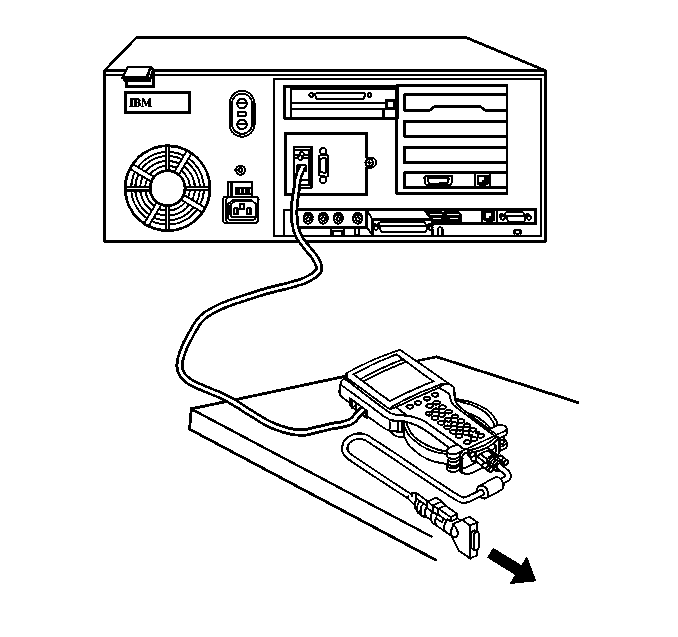Before Programming a Control Module
Important: DO NOT program a control module unless you are directed by a service
procedure or you are directed by a General Motors Corporation service bulletin.
Programming a control module at any other time will not permanently
correct a customers concern.
Ensure the following conditions are met before programming a control
module:
| • | Check the vehicle system voltage: |
| - | There is not a charging system concern. All charging system concerns
must be repaired before programming a control module. |
| - | Battery voltage is greater than 12 volts but less than
16 volts--The battery must be charged before programming the control
module if the battery voltage is low. |
| - | A battery charger is NOT connected to the vehicles battery. Incorrect
system voltage or voltage fluctuations from a battery charger, may cause programming
failure or control module damage. |
| - | Turn OFF or disable any system that may put a load on the vehicles
battery, including the following components: |
| • | Daytime running lights (DRL)--Applying the parking brake,
on most vehicles, disables the DRL system. Refer to the Owner's Manual. |
| • | Auxiliary coolant pumps |
| • | Radio, cassette or CD player |
| • | The ignition switch is in the proper position. The Techline terminal
prompts you to turn ON the ignition, with the engine OFF. DO NOT change
the position of the ignition switch during the programming procedure,
unless instructed to do so. |
| • | All tool connections are secure, including the following items: |
| - | The connection at the DLC |
| - | The voltage supply circuits |
Programming the ECM

Notice: DO NOT disturb the tool harness while programming. If an interruption
occurs during the programming procedure, programming failure or control module
damage may occur.
Important: The ECM can only be programmed using the Pass-Thru Programming method.
The Pass-Thru Programming method requires the use of a scan tool in series
with the Techline Terminal and the DLC.
- Turn OFF the ignition.
- From the Techline terminal, select Service Programming System.
- Select Pass-Thru as the Diagnostic Tool.
- Select the Programming Process you are using.
- Select Vehicle for the ECU location.
- Complete the vehicle information on the Connect Scan Tool/Determine
Vehicle screen.
- Turn ON the ignition, with the engine OFF.
- Install the Tech 2 to the data link connector (DLC).
- Connect the RS-232 cable to the Tech 2 and the Techline
terminal.
- Turn ON the Tech 2 and wait for the Start screen.
- Verify the displayed VIN on the Techline terminal with the vehicle
VIN. Correct the VIN as necessary.
- Select the type of module you are programming.
- Select the type of programming that you are performing.
- Select the appropriate calibration file.
Important: DO NOT turn OFF the ignition if the programming procedure is interrupted
or unsuccessful. Ensure that all the ECM and DLC connections are secure and
the Techline operating software is up to date. Attempt to reprogram the
control module. If the control module cannot be programmed, replace the
control module. Refer to
Engine Control Module Replacement
.
- Verify the Current calibration with the Selected calibration then select
Next. This will initiate the download of the calibration files.
- After the download is complete, EXIT Service Programming.
- Turn OFF the ignition for 30 seconds.
- If the control module was replaced, the following procedures must
be performed:
Programming Verification
- Use the scan tool in order to clear the DTCs.
- Attempt to start the engine.
- Repeat the Service Programming procedure if the engine does not
start or operates poorly. Perform the following procedures before programming
the ECM.
| • | Ensure the control module and DLC connections are OK. |
| • | Ensure the Techline operating software is up to date. |
| • | Ensure the calibration part number is correct for the vehicle. |
- Program the control module. If the control module still cannot
be programmed properly, replace the control module. Refer to
Engine Control Module Replacement
.

